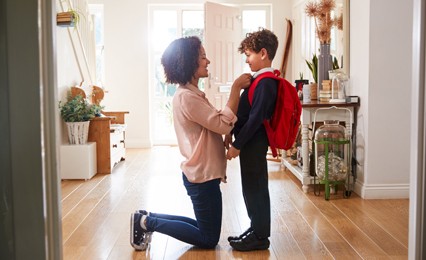When your child started primary school, you or your child were reluctant to leave the other. You questioned how they were fitting in, if they managed to get to the toilets, and having your phone ready and waiting in case the school tried to contact you for any reason. As a parent, it’s probably more nerve-wracking for you than for your child.
However, they’ve mastered primary school and are transitioning to secondary school, where they will be traveling to and from school on their own, having new teachers and making new friends, and being more independent and responsible for their learning. This can be nerve-wracking, so we have some tips to help prepare your child for secondary school.
Talking to them
Ask what they’re looking forward to. Are any of their primary school friends going to the same secondary school? If so, this can be a positive experience as they won’t feel completely alone and have a familiar face to feel more comfortable. Ask what they’re nervous about. Are they worried about particular subjects? Being in new surroundings? Meeting new students? Together you can talk it through and develop some strategies and positive ideas to help them feel more comfortable.
Familiarity
Going to the secondary school open days so your child can get a rough idea about where classes and departments are, where they can find the library, the toilets, the school hall, and the canteen will make them feel more comfortable when they start. Some secondary schools have a summer school for new students beginning in September, as a way to meet new students, allowing them to make new friends, so they already know other children before they officially start secondary school. Summer schools also enable your child to meet some teachers and get used to the school’s layout.
Encourage independence
If your child will be going to and from school independently, it’s a good idea before secondary school starts to do a couple of trial runs of them traveling on the bus on their own. By doing this, they can get used to the route, what bus stop they need to get off at, and how long it will take to get there, so they know when to leave the house.
Preparation
It’s always an excellent plan to be prepared. Encouraging your child to get their uniform and school bag ready the night before allows for a positive, relaxed start to the following day.
Have a homework and activity schedule on their bedroom wall or the fridge, so you and your child know what’s going on, and you can check in with them and see how their homework is getting on, as well as keeping them on track with their schoolwork.
New school jitters
Your child is going from being a big fish in a small pond to a small fish in a big pond. For some, that can be scary and nerve-wracking, so let them know, they’re not going to be the only nervous newbie there. Talk to them about their first days, and encourage them to ask for help if they can’t find their way around or don’t know what to do in class.

